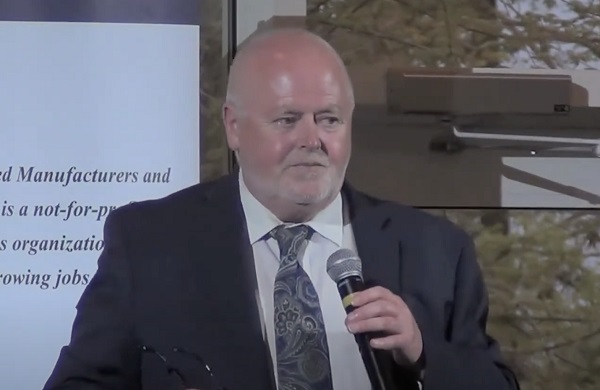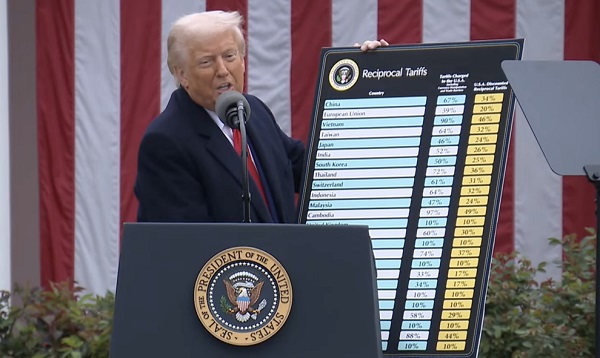Business
Former Canadian broadcast regulator warns against Conservative-backed internet bill

Peter Menzies served as CRTC vice-chair after an extensive career in the newspaper industry
From LifeSiteNews
‘By all means, ensure the Criminal Code is enforced, but do not, under any circumstances, put some puffed-up public servant in charge of patrolling the online world. The state has no business in the WiFi of the nation,’ former CRTC vice-chair Peter Menzies wrote.
One of the past vice-chairs of Canada’s official broadcast regulator, Canada’s Radio-Television Commission (CRTC), has sounded the alarm over recent Conservative-backed federal legislation working its way through the system which looks to severely regulate the internet under the appearance of “protecting children.”
Peter Menzies, who served as the CRTC’s vice-chair for a time after an extensive career in the newspaper industry, and who is not known for being very conservative, wrote in a recent blog post in The Hub that the “[s]tate has no business in the WiFi of the nation,” criticizing in particular Senate Bill S-210.
He specifically used his ink space to criticize the Conservative Party of Canada (CPC) and its leader Pierre Poilievre for supporting Bill S-210.
“The Conservatives, as we speak, are backers of Independent Senator Julie Miville-Dechene’s private member’s Bill S-210. Its intent, like so many pieces of legislation, is virtuous, as it is trying to protect children from access to online pornography. But the road to regulatory hell is paved with good intentions, and the legislation is so clumsily constructed as to pose significant threats to privacy and free expression,” wrote Menzies.
Currently before Canada’s House of Commons for review is Senate Bill S-210, “An Act to restrict young persons’ online access to sexually explicit material.” The bill passed its second reading in the House of Commons last December, with CPC MPs lambasting most Liberal Party MPs for voting against a bill designed to protect children from accessing online pornography.
The creator of the the non-governmental law, Miville-Dechêne, was appointed to the Senate by Prime Minister Justin Trudeau in 2018. It was passed by the Senate in April 2023.
S-210 would create a framework to make it an offense for any organization that makes available “sexually explicit material” to anyone under the age 18 for commercial purposes. Anyone breaking the new rules would be fined $250,000 for the first offense and up to $500,000 for any subsequent offenses.
However, professor Dr. Michael Geist, who has been an open critic of already passed Trudeau government online censorship bills C-18 and C-11, as well as the newly introduced “Online Harms” Bill C-63, has warned that S-210 is an “avalanche” of bad news despite its good intentions.
“Bill S-210 isn’t a slippery slope. It’s an avalanche: Court ordered site blocking that can include lawful content and mandated age verification using facial recognition to access search or social media overseen by CRTC. Conservative MPs voted for this?!” Geist posted recently on X.
Menzies observed that if the Conservatives genuinely “Want to give us back control of our lives and make us the freest people on earth, they could start by stepping back from their recent alliance with Big Government solutions and instead find ways to help individuals take control of their lives by managing what comes into their homes.”
He called S-210 “So clumsily constructed as to pose significant threats to privacy and free expression.”
Menzies warned that Bill S-210, despite its seemingly good intentions, could result in Canadians being forced to use government-issued IDs to access many different internet services.
Menzies wrote that in his view, it makes no sense that the CPC under Poilievre oppose Trudeau’s new Online Harms Act, or Bill C-63, yet support Bill S-210.
As for Bill C-63, it was introduced in the House of Commons on February 26 and was immediately blasted by constitutional experts as very troublesome.
The new law will further regulate the internet and will allow a new digital safety commission to conduct “secret commission hearings” against those found to have violated the new law, raising “serious concerns for the freedom of expression” of Canadians online, one constitutional lawyer warned LifeSiteNews.
The Liberals under Trudeau claim Bill C-63 will target certain cases of internet content removal, notably those involving child sexual abuse and pornography.
The reality is, that the federal government under Trudeau has gone all in on radical transgender ideology, including the so-called “transitioning” of minors, while at the same time introducing laws that on the surface, appear to be about helping children.
Under Trudeau, the federal government has given millions of taxpayer money to fund LGBT groups of various kinds and aggressively pushes a pro-LGBT agenda.
Trudeau gov’t needs to ‘leave legal internet’ content alone
Menzies observed that what needs to happen instead is for governments to “[l]eave legal content on the internet alone,” and instead empower “parents” to have more control over what can be viewed online.
“By all means, ensure the Criminal Code is enforced, but do not, under any circumstances, put some puffed-up public servant in charge of patrolling the online world. The state has no business in the WiFi of the nation,” he wrote.
“Second, empower parents and families with the equipment they need to control their household’s internet access as they see fit and work with the people who really understand technology to do so.”
The CPC under its leader Poilievre has clarified that Conservatives “do not support any measures that would allow the imposition of a digital ID or infringe on the privacy of adults and their freedom to access legal content online,” when it comes to Bill S-210 or another other future law.
Campaign Life Coalition recently warned that Bill C-63, or the Online Harms Act, will stifle free speech and crush pro-life activism.
Automotive
Auto giant shuts down foreign plants as Trump moves to protect U.S. industry

 MxM News
MxM News
Quick Hit:
Stellantis is pausing vehicle production at two North American facilities—one in Canada and another in Mexico—following President Donald Trump’s announcement of 25% tariffs on foreign-made cars. The move marks one of the first corporate responses to the administration’s push to bring back American manufacturing.
Key Details:
-
In an email to workers Thursday, Stellantis North America chief Antonio Filosa directly tied the production pause to the new tariffs, writing that the company is “continuing to assess the medium- and long-term effects” but is “temporarily pausing production” at select assembly plants outside the U.S.
-
Production at the Windsor Assembly Plant in Ontario will be paused for two weeks, while the Toluca Assembly Plant in Mexico will be offline for the entire month of April.
-
These plants produce the Chrysler Pacifica minivan, the new Dodge Charger Daytona EV, the Jeep Compass SUV, and the Jeep Wagoneer S EV.
Diving Deeper:
On Wednesday afternoon in the White House Rose Garden, President Trump announced sweeping new tariffs aimed at revitalizing America’s auto manufacturing industry. The 25% tariffs on all imported cars are part of a broader “reciprocal tariffs” strategy, which Trump described as ending decades of globalist trade policies that hollowed out U.S. industry.
Just a day later, Stellantis became the first major automaker to act on the new policy, halting production at two of its international plants. According to an internal email obtained by CNBC, Stellantis North American COO Antonio Filosa said the company is “taking immediate actions” to respond to the tariff policy while continuing to evaluate the broader impact.
“These actions will impact some employees at several of our U.S. powertrain and stamping facilities that support those operations,” Filosa wrote.
The Windsor, Ontario plant, which builds the Chrysler Pacifica and the newly introduced Dodge Charger Daytona EV, will shut down for two weeks. The Toluca facility in Mexico, responsible for the Jeep Compass and Jeep Wagoneer S EV, will suspend operations for the entire month of April.
The move comes as Stellantis continues to face scrutiny for its reliance on low-wage labor in foreign markets. As reported by Breitbart News, the company has spent years shifting production and engineering jobs to countries like Brazil, India, Morocco, and Mexico—often at the expense of American workers. Last year alone, Stellantis cut around 400 U.S.-based engineering positions while ramping up operations overseas.
Meanwhile, General Motors appears to be responding differently. According to Reuters, GM told employees in a webcast Thursday that it will increase production of light-duty trucks at its Fort Wayne, Indiana plant—where it builds the Chevrolet Silverado and GMC Sierra. These models are also assembled in Mexico and Canada, but GM’s decision suggests a shift in production to the U.S. could be underway in light of the tariffs.
As Trump’s trade reset takes effect, more automakers are expected to recalibrate their production strategies—potentially signaling a long-awaited shift away from offshoring and toward rebuilding American industry.
Business
‘Time To Make The Patient Better’: JD Vance Says ‘Big Transition’ Coming To American Economic Policy

JD Vance on “Rob Schmitt Tonight” discussing tariff results

From the Daily Caller News Foundation
By Hailey Gomez
Vice President JD Vance said Thursday on Newsmax that he believes Americans will “reap the benefits” of the economy as the Trump administration makes a “big transition” on tariffs.
The Dow Jones Industrial Average dropped 1,679.39 points on Thursday, just a day after President Donald Trump announced reciprocal tariffs against nations charging imports from the U.S. On “Rob Schmitt Tonight,” Schmitt asked Vance about the stock market hit, asking how the White House felt about the “Liberation Day” move.
“We’re feeling good. Look, I frankly thought in some ways it could be worse in the markets, because this is a big transition. You saw what the President said earlier today. It’s like a patient who was very sick,” Vance said. “We did the operation, and now it’s time to make the patient better. That’s exactly what we’re doing. We have to remember that for 40 years, we’ve been doing this for 40 years.”
“American economic policy has rewarded people who ship jobs overseas. It’s taxed our workers. It’s made our supply chains more brittle, and it’s made our country less prosperous, less free and less secure,” Vance added.
Vance recalled that one of his children had been sick and needed antibiotics that were not made in the United States. The Vice President called it a “ridiculous thing” that some medicines invented in the country are no longer manufactured domestically.
“That’s fundamentally what this is about. The national security of manufacturing and making the things that we need, from steel to pharmaceuticals, antibiotics, and so forth, but also the good jobs that come along when you have economic policies that reward investing in America, rather than investing in foreign countries,” Vance said.
WATCH:
With a baseline 10% tariff placed on an estimated 60 countries, higher tariffs were applied to nations like China and Israel. For example, China, which has a 67% tariff on U.S. goods, will now face a 34% tariff from the U.S., while Israel, which has a 33% tariff, will face a 17% U.S. tariff.
“One bad day in the stock market, compared to what President Trump said earlier today, and I think he’s right about this. We’re going to have a booming stock market for a long time because we’re reinvesting in the United States of America. More importantly than that, of course, the people in Wall Street have done well,” Vance said.
“We want them to do well. But we care the most about American workers and about American small businesses, and they’re the ones who are really going to benefit from these policies,” Vance said.
The number of factories in the U.S., Vance said, has declined, adding that “millions of workers” have lost their jobs.
“My town [Middletown, Ohio], where you had 10,000 great American steel workers, and my town was one of the lucky ones, now probably has 1,500 steel workers in that factory because you had economic policies that rewarded shipping our jobs to China instead of investing in American workers,” Vance said. “President Trump ran on changing it. He promised he would change it, and now he has. I think Americans are going to reap the benefits.”
-

 2025 Federal Election2 days ago
2025 Federal Election2 days ago‘I’m Cautiously Optimistic’: Doug Ford Strongly Recommends Canada ‘Not To Retaliate’ Against Trump’s Tariffs
-

 Alberta2 days ago
Alberta2 days agoBig win for Alberta and Canada: Statement from Premier Smith
-

 Catherine Herridge2 days ago
Catherine Herridge2 days agoFBI imposed Hunter Biden laptop ‘gag order’ after employee accidentally confirmed authenticity: report
-

 Business2 days ago
Business2 days agoCanada may escape the worst as Trump declares America’s economic independence with Liberation Day tariffs
-

 Canadian Energy Centre1 day ago
Canadian Energy Centre1 day agoSaskatchewan Indigenous leaders urging need for access to natural gas
-

 Business1 day ago
Business1 day agoB.C. Credit Downgrade Signals Deepening Fiscal Trouble
-

 Business2 days ago
Business2 days agoTrump orders 10% baseline tariff on imports, closes de minimis loophole
-

 2025 Federal Election1 day ago
2025 Federal Election1 day agoHighly touted policies the Liberal government didn’t actually implement





